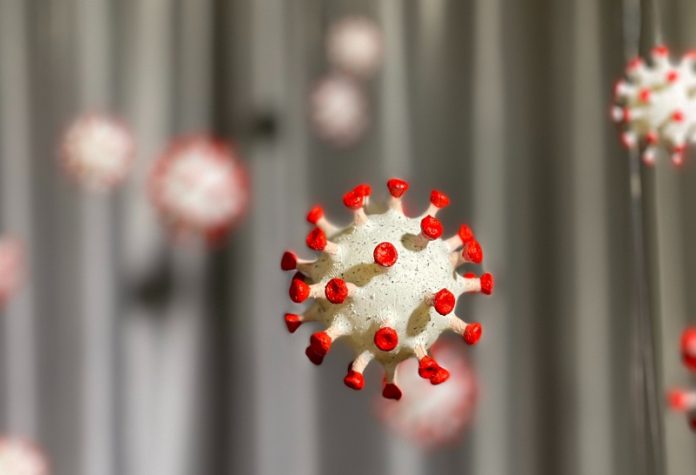
In a new study from Rutgers, researchers found an antiviral drug used to treat SARS-CoV-2 remains effective against the newest variants of the evolving virus.
They concluded that the Pfizer antiviral drug Paxlovid still quashes COVID by jamming the cell machinery of a key protein, known as the “main protease” or Mpro, involved in replicating the virus.
The study is published in the journal Cell Research and was conducted by Jun Wang et al.
As COVID’s Omicron variant spreads rapidly throughout the world, with recent severe outbreaks in Asia, authorities have watched to see whether the virus evolves “resistance,” evading the defenses provided by current medicines.
With only a few drugs that are available to treat COVID, physicians are counting on treatments like Paxlovid to stem the spread.
In the study, the team accessed a public database known as GISAID, studying the Mpro sequences of all strains of COVID detected so far.
The protein is central to the reproduction of the virus and the target of the antiviral Paxlovid.
Comparing more recent strains with earlier strains collected by physicians around the world, the scientists searched for mutations in genetic sequences of Mpro that occur when a virus replicates.
Mutations can lead to possible new structures of Mpro, which are generally correlated with drug resistance.
The researchers found the top 25 most common new mutations in the main protease of many Omicron strains, a discovery Wang characterized as “concerning,” with the most common one called P132H.
When they tested Paxlovid against the Mpro with the P132H mutation, the antiviral remained effective.
This was further confirmed by the X-ray crystallography, showing that the P132H did not change the Mpro structure significantly.
The team says although this mutation does not cause the drug resistance to Paxlovid, this implies that the virus can still evolve to create additional mutations that might cause drug resistance.
Wang’s lab is working to develop new antivirals against COVID by targeting the Mpro and another key protein known as the papain-like protease.
Related: This old drug can save your life from COVID-19.
On Jan 21st, 2022, the U.S. Food and Drug Administration took two actions to expand the use of the antiviral drug Veklury (remdesivir) to certain non-hospitalized adults and pediatric patients for the treatment of mild-to-moderate COVID-19 disease.
This provides another treatment option to reduce the risk of hospitalization in high-risk patients. Previously, the use of Veklury was limited to patients requiring hospitalization.
Veklury is not a substitute for vaccination in individuals for whom COVID-19 vaccination and a booster dose are recommended.
The FDA has approved one vaccine and authorized others to prevent COVID-19 and the serious clinical outcomes associated with COVID-19, including hospitalization and death.
The FDA urges the public to get vaccinated and receive a booster if eligible. Learn more about FDA-approved or -authorized COVID-19 vaccines.
The FDA has expanded the approved indication for Veklury to include its use in adults and pediatric patients (12 years of age and older who weigh at least 40 kilograms, which is about 88 pounds) with positive results of direct SARS-CoV-2 viral testing, and who are not hospitalized and have mild-to-moderate COVID-19, and are at high risk for progression to severe COVID-19, including hospitalization or death.
The agency also revised the Emergency Use Authorization (EUA) for Veklury to additionally authorize the drug for the treatment of pediatric patients weighing 3.5 kilograms to less than 40 kilograms or pediatric patients less than 12 years of age weighing at least 3.5 kilograms, with positive results of direct SARS-CoV-2 viral testing, and who are not hospitalized and have mild-to-moderate COVID-19, and are at high risk for progression to severe COVID-19, including the hospitalization of death.
Based on these actions, these high-risk non-hospitalized patients may receive Veklury via intravenous infusion for a total of three days for the treatment of mild-to-moderate COVID-19 disease.
The approval of Veklury for use in non-hospitalized patients is supported by a randomized, placebo-controlled clinical trial that included 562 non-hospitalized patients with mild-to-moderate COVID-19 who were at high risk for progression to severe COVID-19, including hospitalization or death.
The main outcome measured in the trial was whether a patient was hospitalized for any COVID-19 related reason or died from any reason within 28 days of treatment.
Overall, 2 of 279 patients who received Veklury (0.7%) required COVID-19 related hospitalization compared to 15 of 283 patients who received a placebo (5.3%). There were no deaths in either group.
Pediatric patients for whom Veklury is authorized will receive doses adjusted for their body weight in order to achieve comparable exposures to adults and pediatric patients receiving the approved dose.
Given the similar course of COVID-19 disease, the authorization of Veklury in certain pediatric patients is based on extrapolation of efficacy from adequate and well-controlled studies in adults.
Important details about using Veklury to treat COVID-19 for its approved use is available in the prescribing information, which includes dosing instructions, potential side effects and drug interactions.
Possible side effects include increased levels of liver enzymes, which may be a sign of liver injury; and allergic reactions, which may include changes in blood pressure and heart rate, low blood oxygen level, fever, shortness of breath, wheezing, swelling (e.g., lips, around eyes, under the skin), rash, nausea, sweating or shivering.
If you care about COVID, please read studies about existing drug that could inhibit COVID-19 virus, and aspirin and other common anti-inflammatory drugs could help prevent COVID-19 deaths.
For more information about COVID, please see recent studies that early use of this blood thinner drug may reduce COVID-19 death, and this drug may prevent respiratory and heart damage in people with COVID-19.
Copyright © 2022 Knowridge Science Report. All rights reserved.



